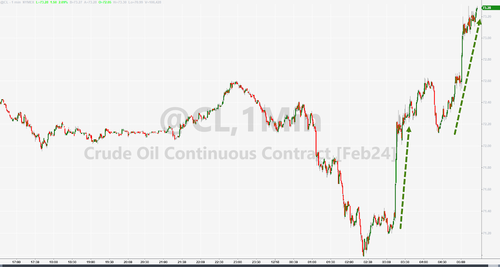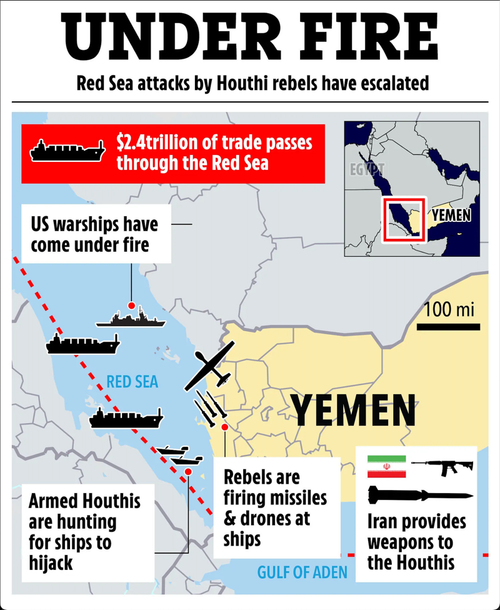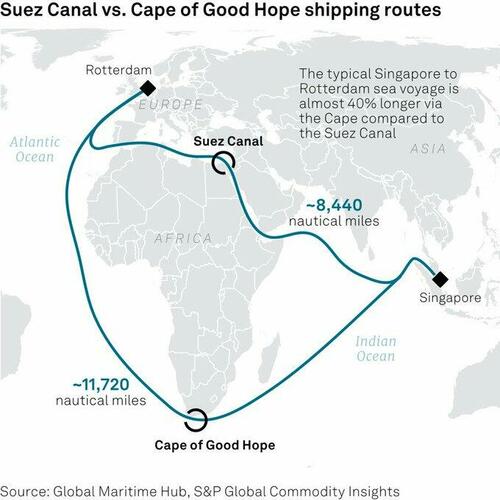
The number of major shipping firms halting all commercial sailings through the highly trafficked Red Sea strait has increased to five from four in response to missile and drone attacks by Yemen's Iran-backed Houthis.
Bloomberg reports that energy giant BP Plc is the latest shipper to pause all tanker sailings through the strategic Bab al-Mandab strait due to Houthi militants.
"In light of the deteriorating security situation for shipping in the Red Sea, BP has decided to temporarily pause all transits through the Red Sea," BP said in a statement.
Besides BP, Maersk, Hapag-Lloyd, CMA CGM, and Mediterranean Shipping Company have all paused commercial vessel operations through the Red Sea that connects to Egypt's Suez Canal.
Spillover risks of the Israel-Hamas war are quickly building, as the Red Sea is responsible for 40% of the world's international trade.
Over the weekend, US Central Command wrote in a post on X that the Burke-class guided-missile destroyer USS Carney shot down 14 Houthi drones in the Red Sea.
On Monday morning, the UK Navy said it received a report of a possible explosion on the water about 30 miles south of Port Mokha, Yemen.
The chaos has caused some shippers to divert vessels around the Cape of Good Hope to avoid the conflict area.
The acceleration of de-globalization is leading to a surge of uncertainty along major global maritime routes.
Update:
Add Taiwanese container shipping line Evergreen and Belgian tanker owner Euronav to the growing list of major shipping firms halting all sails through the Red Sea strait. This brings the total to seven.
Also, the UK Navy disclosed more details regarding today’s incident in the Red Sea, reporting that an explosion hit the side of a commercial vessel near Yemen. The Norwegian owner of the ship confirmed that an “unidentified object” had impacted the vessel on the port side.
Bloomberg reports:
Brent crude futures have risen 3% from the lows of $75.81 a barrel since 0515 ET after reports started to trickle in about another incident in the Red Sea and more shippers were halting sailings in the region.
Between 10% and 12% of global trade passes through the Red Sea each year.
The US Energy Information Administration estimated that 8.8 million barrels per day pass through the region.
Other figures show the Suez Canal, a major Red Sea passage, handled nearly 1 billion tons of cargo in 2022. This means about 2.7 million tons per day flow through the region.
All the chaos in the Red Sea has forced London maritime insurers to expand war risk coverage to the area.
* * *
The number of major shipping firms halting all commercial sailings through the highly trafficked Red Sea strait has increased to five from four in response to missile and drone attacks by Yemen’s Iran-backed Houthis.
Bloomberg reports that energy giant BP Plc is the latest shipper to pause all tanker sailings through the strategic Bab al-Mandab strait due to Houthi militants.
“In light of the deteriorating security situation for shipping in the Red Sea, BP has decided to temporarily pause all transits through the Red Sea,” BP said in a statement.
Besides BP, Maersk, Hapag-Lloyd, CMA CGM, and Mediterranean Shipping Company have all paused commercial vessel operations through the Red Sea that connects to Egypt’s Suez Canal.
Spillover risks of the Israel-Hamas war are quickly building, as the Red Sea is responsible for 10% of the world’s international trade.
Over the weekend, US Central Command wrote in a post on X that the Burke-class guided-missile destroyer USS Carney shot down 14 Houthi drones in the Red Sea.
On Monday morning, the UK Navy said it received a report of a possible explosion on the water about 30 miles south of Port Mokha, Yemen.
The chaos has caused some shippers to divert vessels around the Cape of Good Hope to avoid the conflict area.
The acceleration of de-globalization is leading to a surge of uncertainty along major global maritime routes.
Loading…








